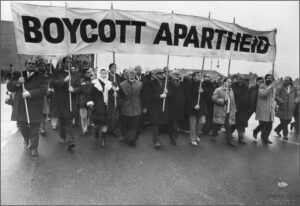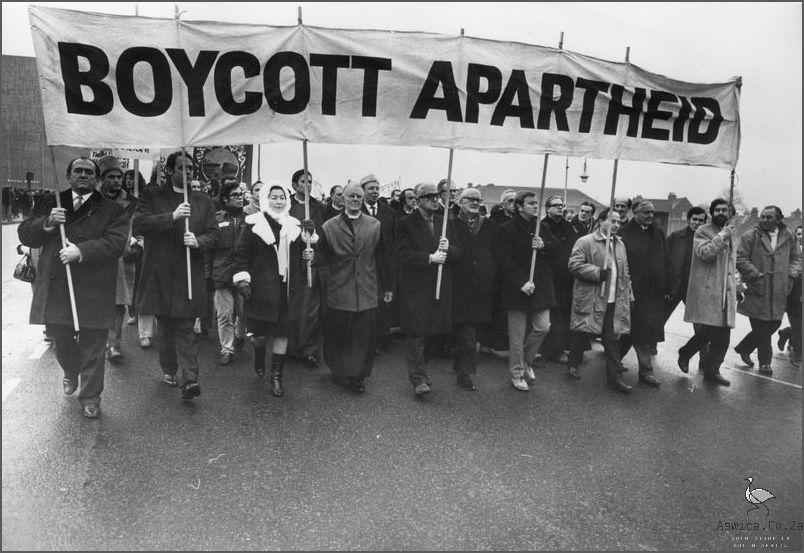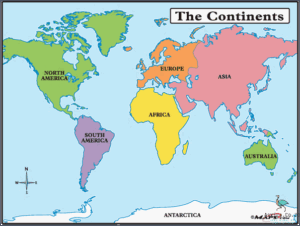
Apartheid, the racial segregation and discrimination that was the official policy of the South African government from 1948 to 1994, was brought to an end by a concerted effort from both inside and outside the country. Internationally, the United Nations, the European Union, and the United States, among other countries, imposed economic sanctions on South Africa in an effort to force it to abandon its policy of racial discrimination and segregation. Domestically, a long and peaceful struggle against apartheid was waged by the African National Congress (ANC) and other anti-apartheid organizations.
The ANC was founded in 1912 to promote the rights of blacks in South Africa and fought for an end to apartheid through peaceful means. In the 1950s and 1960s, the ANC led nonviolent protests, strikes and boycotts against the government. In the late 1960s, some in the ANC, led by Nelson Mandela, embraced armed struggle as a means to bring about the end of apartheid. Mandela, who was arrested and imprisoned in 1962, served 27 years in prison before his release in 1990. After his release, Mandela continued to lead the ANC in negotiations with the government, which eventually led to the end of apartheid.
South African President F.W. de K
Contents
- 1 Who Helped End Apartheid In South Africa
- 2 The Role of the ANC in the Struggle to End Apartheid: An overview of the ANC’s anti-apartheid activities, including protests and negotiations
- 3 International Pressure and Sanctions on South Africa: How international sanctions and boycotts impacted Apartheid
- 4 Post-Apartheid South Africa: The successes and challenges of post-Apartheid South Africa
- 5 Conclusion
Who Helped End Apartheid In South Africa
Nelson Mandela is widely known for his role in helping to end apartheid in South Africa. He was a leader in the African National Congress, and was a major advocate for the rights of black South Africans. He was arrested and imprisoned for 27 years due to his activism, but was eventually released in 1990. Upon his release, Mandela continued to lead the anti-apartheid movement and worked to create a new constitution that would guarantee equal rights for all South Africans. He was eventually elected President of South Africa in 1994, and his election ushered in a new era of peace and democracy. Other activists and organizations, such as the United Nations and the International Court of Justice, played a major role in the dismantling of apartheid in South Africa as well. Their efforts helped to ensure that South Africa would become a more equitable and just nation.
The Role of the ANC in the Struggle to End Apartheid: An overview of the ANC’s anti-apartheid activities, including protests and negotiations
The African National Congress (ANC) was the primary organization responsible for leading the fight against apartheid in South Africa. Founded in 1912, the ANC was dedicated to achieving equality and justice for all South Africans, regardless of race. After the National Party came to power in 1948 and began implementing apartheid, the ANC became the main opposition to the government. Throughout the 1950s and 1960s, the ANC organized a range of non-violent protests and civil disobedience campaigns to demonstrate against the oppressive laws and policies of the apartheid government.
In the 1970s, the ANC shifted its strategy to focus on armed struggle. The organization formed the military wing of the ANC, Umkhonto we Sizwe (“Spear of the Nation”). This group launched attacks against government buildings and security forces to show the government that they would not be intimidated by oppressive laws. The ANC also began to form international alliances to garner support for their cause. In the 1980s, the ANC began to participate in negotiations with the government. These talks eventually led to the end of apartheid in 1994.
The ANC’s role in the struggle to end apartheid is undeniable. From the early days of peaceful marches and civil disobedience to the later years of armed struggle and negotiations, the ANC was essential in the fight to bring equality to South Africa. The ANC’s struggle against apartheid is an example of the power of peaceful protest and political negotiations, and their efforts remain an inspiration to people throughout the world.
International Pressure and Sanctions on South Africa: How international sanctions and boycotts impacted Apartheid
The international pressure and sanctions on South Africa during the Apartheid era were instrumental in helping to end the oppressive regime. This pressure came from both global governments and international organizations, as well as from grassroots movements within South Africa. All of these forces worked together to create a movement that was both powerful and effective in bringing about social change.
The United Nations was one of the first organizations to take a stand against Apartheid. In 1966, the UN Security Council passed Resolution 181, which condemned the South African government’s policy of racial segregation. This resolution was supported by many nations, including the United States, the United Kingdom, France, and the Soviet Union. This marked the beginning of an international campaign to put an end to Apartheid.

In addition to the UN, several other organizations played an important role in challenging Apartheid. The African National Congress (ANC) was one of the most prominent anti-Apartheid organizations. They led campaigns of civil disobedience and non-violent protests, which were often met with brutal repression. International support for the ANC helped to sustain their efforts and galvanize international attention to the issue of Apartheid.
This international pressure ultimately led to economic sanctions against South Africa. In the 1980s and 1990s, many countries imposed economic sanctions, including an arms embargo, as well as restrictions on trade, investments, and financial transactions. These sanctions were meant to pressure the South African government to end its oppressive policies.
The sanctions were also met with a powerful response from the grassroots movement within South Africa. The South African people, led by the ANC, held mass protests, strikes, and boycotts of companies that did business with the government. This showed the world that the South African people wanted a better life and the end of Apartheid.
The international pressure and sanctions on South Africa, combined with the protests of the South African people, ultimately led to the end of Apartheid in 1994. The ANC, led by Nelson Mandela, was elected to power and the country embarked on a new era of democracy and freedom.
While the international pressure and sanctions on South Africa were instrumental in helping to end Apartheid, it is important to recognize the tremendous effort of the South African people in bringing about the end of this oppressive regime. Without their courage and determination, the downfall of Apartheid would not have been possible.
Post-Apartheid South Africa: The successes and challenges of post-Apartheid South Africa
The end of apartheid in South Africa is one of the most remarkable stories of modern history. The brutal, oppressive system of racial segregation that had been enforced by the National Party for decades was overturned in the 1990s, largely due to the efforts of a few brave individuals and organizations. Who are these people and organizations who helped bring apartheid to an end?
Nelson Mandela was probably the most prominent figure of the anti-apartheid movement. He was imprisoned for his activism, but his courage and commitment to ending racial inequality earned him the Nobel Peace Prize in 1993. He was released from prison in 1990, and went on to become the first black President of South Africa in 1994.
The African National Congress (ANC) is another important organization that played a key role in ending apartheid. Founded in 1912 to fight for the rights of black South Africans, the ANC was at the forefront of the anti-apartheid movement throughout the years of oppression. The ANC championed the cause of racial equality, and its members were often willing to put their lives on the line in pursuit of this goal.
The international community also played an important role in ending apartheid. Pressure was placed on the South African government to end its oppressive policies, and many countries imposed economic sanctions on the country as a result. This increased pressure on the government, and eventually forced it to open negotiations with the ANC and other anti-apartheid organizations.
In addition to these organizations, there were individuals who made a significant contribution to the ending of apartheid. Archbishop Desmond Tutu was one of the most prominent voices for change in South Africa, and his efforts helped to bring about the end of apartheid. Other individuals who played a role in this process included Steve Biko, Winnie Mandela, and Albertina Sisulu.
The end of apartheid in South Africa is a testament to the power of individuals and organizations to effect meaningful change. The individuals and organizations mentioned above, as well as countless others, played a key role in helping to bring about the end of this oppressive system. Since the end of apartheid, South Africa has made significant strides towards greater racial equality, but there are still many challenges ahead.
Conclusion
The end of apartheid in South Africa is largely credited to the tireless efforts of a number of individuals and groups. Chief among them were Nelson Mandela and the African National Congress (ANC) who, through their activism and advocacy, were able to bring much needed attention to the issue and pressure both the South African government and the international community to take action. In addition, the United Nations and its member states, as well as other non-governmental organizations, played a major role in the end of apartheid by imposing economic sanctions against South Africa, voicing their opposition to the system and providing financial aid to support the anti-apartheid movement. Ultimately, it was the combined efforts of these individuals, organizations and governments that led to the end of apartheid in South Africa and paved the way for a new era of freedom and democracy.




